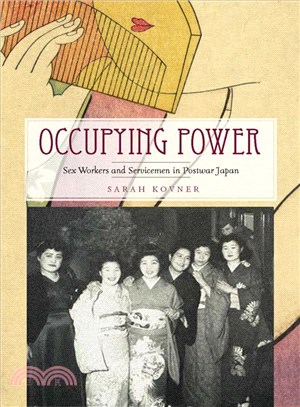Occupying Power
商品資訊
系列名:Studies of the Weatherhead East Asian Institute,
ISBN13:9780804776912
替代書名:Occupying Power
出版社:Stanford Univ Pr
作者:Sarah Kovner
出版日:2012/02/08
裝訂/頁數:精裝/226頁
規格:23.5cm*15.9cm*2.5cm (高/寬/厚)
定價
:NT$ 6600 元若需訂購本書,請電洽客服 02-25006600[分機130、131]。
商品簡介
作者簡介
相關商品
商品簡介
The year was 1945. Hundreds of thousands of Allied troops poured into war-torn Japan and spread throughout the country, altering both the built environment and the country's psychological landscape. The effect of this influx on the local population did not lessen in the years following the war's end. In fact, the presence of foreign servicemen also heightened the visibility of certain others, particularly panpan—streetwalkers—who were objects of their desire.
Occupying Power shows how intimate histories and international relations are interconnected in ways scholars have only begun to explore. Although sex workers became symbols of Japan's diminished status, by earning scarce dollars they helped jump-start economic recovery. But sex workers who catered to servicemen were nonetheless a frequent target. They were blamed for increases in venereal disease. They were charged with diluting the Japanese race by producing mixed-race offspring. In 1956, Japan passed its first national law against prostitution. Though empowered female legislators had joined with conservatives in this effort to reform and rehabilitate, the law produced an unanticipated effect. By ending a centuries-old tradition of sex work regulation, it made sex workers less visible and more vulnerable.
This probing history reveals an important but underexplored aspect of the Japanese occupation and its effect on gender and society. It seeks to shift the terms of debate on a number of controversies, including Japan's history of forced sexual slavery, rape accusations against U.S. servicemen, opposition to U.S. overseas bases, and sexual trafficking.
Occupying Power shows how intimate histories and international relations are interconnected in ways scholars have only begun to explore. Although sex workers became symbols of Japan's diminished status, by earning scarce dollars they helped jump-start economic recovery. But sex workers who catered to servicemen were nonetheless a frequent target. They were blamed for increases in venereal disease. They were charged with diluting the Japanese race by producing mixed-race offspring. In 1956, Japan passed its first national law against prostitution. Though empowered female legislators had joined with conservatives in this effort to reform and rehabilitate, the law produced an unanticipated effect. By ending a centuries-old tradition of sex work regulation, it made sex workers less visible and more vulnerable.
This probing history reveals an important but underexplored aspect of the Japanese occupation and its effect on gender and society. It seeks to shift the terms of debate on a number of controversies, including Japan's history of forced sexual slavery, rape accusations against U.S. servicemen, opposition to U.S. overseas bases, and sexual trafficking.
作者簡介
Sarah Kovner is Assistant Professor of History and Asian Studies at the University of Florida.
主題書展
更多
主題書展
更多書展今日66折
您曾經瀏覽過的商品
購物須知
外文書商品之書封,為出版社提供之樣本。實際出貨商品,以出版社所提供之現有版本為主。部份書籍,因出版社供應狀況特殊,匯率將依實際狀況做調整。
無庫存之商品,在您完成訂單程序之後,將以空運的方式為你下單調貨。為了縮短等待的時間,建議您將外文書與其他商品分開下單,以獲得最快的取貨速度,平均調貨時間為1~2個月。
為了保護您的權益,「三民網路書店」提供會員七日商品鑑賞期(收到商品為起始日)。
若要辦理退貨,請在商品鑑賞期內寄回,且商品必須是全新狀態與完整包裝(商品、附件、發票、隨貨贈品等)否則恕不接受退貨。
























